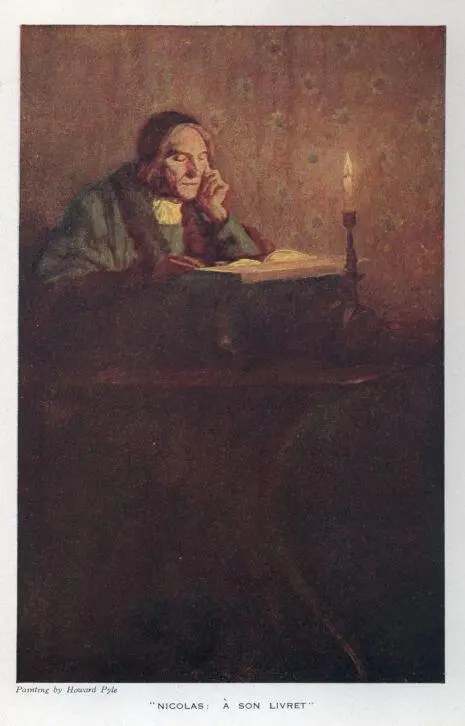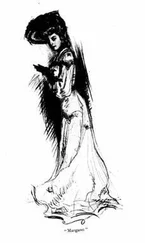James Cabell - Chivalry
Здесь есть возможность читать онлайн «James Cabell - Chivalry» весь текст электронной книги совершенно бесплатно (целиком полную версию без сокращений). В некоторых случаях можно слушать аудио, скачать через торрент в формате fb2 и присутствует краткое содержание. Жанр: Фэнтези, на английском языке. Описание произведения, (предисловие) а так же отзывы посетителей доступны на портале библиотеки ЛибКат.
- Название:Chivalry
- Автор:
- Жанр:
- Год:неизвестен
- ISBN:нет данных
- Рейтинг книги:3 / 5. Голосов: 1
-
Избранное:Добавить в избранное
- Отзывы:
-
Ваша оценка:
- 60
- 1
- 2
- 3
- 4
- 5
Chivalry: краткое содержание, описание и аннотация
Предлагаем к чтению аннотацию, описание, краткое содержание или предисловие (зависит от того, что написал сам автор книги «Chivalry»). Если вы не нашли необходимую информацию о книге — напишите в комментариях, мы постараемся отыскать её.
Chivalry — читать онлайн бесплатно полную книгу (весь текст) целиком
Ниже представлен текст книги, разбитый по страницам. Система сохранения места последней прочитанной страницы, позволяет с удобством читать онлайн бесплатно книгу «Chivalry», без необходимости каждый раз заново искать на чём Вы остановились. Поставьте закладку, и сможете в любой момент перейти на страницу, на которой закончили чтение.
Интервал:
Закладка:
Chivalry
By
James Branch Cabell
"And I, according to my copy, and
after the simple cunning that God hath
sent to me, have down set this in print,
to the intent that noble men may see and
learn the noble acts of chivalry."
TO
Anne Branch Cabell
"AINSI À VOUS, MADAME, À MA TRÈS HAULTE ET
TRÈS NOBLE DAME, À QUI J'AYME À DEVOIR
ATTACHEMENT ET OBÉISSANCE,
J'ENVOYE CE LIVRET."

Precautional
Imprimis, as concerns the authenticity of these tales perhaps the less debate may be the higher wisdom, if only because this Nicolas de Caen, by common report, was never a Gradgrindian. And in this volume in particular, writing it (as Nicolas is supposed to have done) in 1470 , as a dependant on the Duke of Burgundy, it were but human nature should our author be a little niggardly in his ascription of praiseworthy traits to any member of the house of Lancaster or of Valois. Rather must one in common reason accept him as confessedly a partisan writer, who upon occasion will recolor an event with such nuances as will be least inconvenient to a Yorkist and Burgundian bias.
The reteller of these stories needs in addition to plead guilty of having abridged the tales with a free hand. Item, these tales have been a trifle pulled about, most notably in "THE STORY OF THE SATRAPS, " where it seemed advantageous, on rejection, to put into Gloucester's mouth a history which in the original version was related ab ovo, and as a sort of bungling prologue to the story proper. Item, some passages have been restored in book-form—pre-eminently to "THE STORY OF THE HOUSEWIFE" —that in an anterior publication had been unavoidably deleted through consideration of space.
And—"sixth and lastly"—should confession be made that in the present rendering a purely arbitrary title has been assigned this little book; and chiefly for commercial reasons, since the word "dizain" has been adjudged both untranslatable and, in its pristine form, repellantly outré.
You are to give my makeshift, then, a wide interpretation; and are always to remember that in the bleak, florid age these tales commemorate this chivalry was much the rarelier significant of any personal trait than of a world-wide code in consonance with which all estimable people lived and died. Its root was the assumption (uncontested then) that a gentleman will always serve his God, his honor and his lady without any reservation; nor did the many emanating by-laws ever deal with special cases as concerns this triple, fixed, and fundamental homage.
So here you have a chance to peer at our world's youth when chivalry was regnant, and common-sense and cowardice were still at nurse. And, questionless, these same conditions were the source of an age-long mêlée—such as this week is, happily, impossible in any of our parishes—wherein contended "courtesy, and humanity, friendliness, hardihood, love and friendship, and murder, hate, and virtue, and sin." So that I can only counsel you to do after the excellencies and leave the iniquity.
And for the rest, since good wine needs no hush, and an inferior beverage is not likely to be bettered by arboreal adornment, the reteller of these tales prefers to piece out his exordium (however lamely) with "THE PRINTER'S PREFACE." And it runs in this fashion:
"Here begins the volume called and entitled the Dizain of Queens, composed and extracted from divers chronicles and other sources of information, by that extremely venerable person and worshipful man, Messire Nicolas de Caen, priest and chaplain to the right noble, glorious and mighty prince in his time, Philippe, Duke of Burgundy, of Brabant, etc., in the year of the Incarnation of our Lord God a thousand four hundred and seventy; and imprinted by me, Colard Mansion, at Bruges, in the year of our said Lord God a thousand four hundred and seventy-one; at the commandment of the right high, mighty and virtuous Princess, my redoubted Lady, Isabella of Portugal, by the grace of God Duchess of Burgundy and Lotharingia, of Brabant and Limbourg, of Luxembourg and of Gueldres, Countess of Flanders, of Artois, and of Burgundy, Palatine of Hainault, of Holland, of Zealand and of Namur, Marquesse of the Holy Empire, and Lady of Frisia, of Salins and of Mechlin; whom I beseech Almighty God less to increase than to continue in her virtuous disposition in this world, and after our poor fleet existence to receive eternally. Amen."
The Prologue
À sa Dame
"Afin que les entreprises honorables et les nobles aventures
et faicts d'armes soyent noblement enregistrés et conservés,
je vais traiter et raconter et inventer ung galimatias."
THE DIZAIN OF QUEENS OF THAT NOBLE MAKER IN THE
FRENCH TONGUE, MESSIRE NICOLAS DE CAEN, DEDICATED
TO THE MOST ILLUSTRIOUS ISABELLA OF PORTUGAL, OF
THE HOUSE OF THE INDOMITABLE ALFONSO HENRIQUES,
AND DUCHESS DOWAGER OF BURGUNDY. HERE BEGINS
IN AUSPICIOUS WISE THE PROLOGUE.
Inasmuch as it was by your command, illustrious and exalted lady, that I have gathered together these stories to form the present little book, you should the less readily suppose I have presumed to dedicate to your Serenity this trivial offering because of my esteeming it to be not undeserving of your acceptance. The truth is otherwise; and your postulant now approaches as one not spurred toward you by vainglory but rather by plain equity, and simply in acknowledgment of the fact that he who seeks to write of noble ladies must necessarily implore at outset the patronage of her who is the light and mainstay of our age. In fine, I humbly bring my book to you as Phidyle approached another and less sacred shrine, farre pio et salente mica , and lay before you this my valueless mean tribute not as appropriate to you but as the best I have to offer.
It is a little book wherein I treat of divers queens and of their love-business; and with necessitated candor I concede my chosen field to have been harvested, and even scrupulously gleaned, by many writers of innumerable conditions. Since Dares Phrygius wrote of Queen Heleine and Virgil (that shrewd necromancer) of Queen Dido, a preponderating mass of clerks, in casting about for high and serious matter, have chosen, as though it were by common instinct, to dilate upon the amours of royal women. Even in romance we scribblers must contrive it so that the fair Nicolette shall be discovered in the end to be no less than the King's daughter of Carthage, and that Sir Doon of Mayence shall never sink in his love-affairs beneath the degree of a Saracen princess; and we are backed in this old procedure not only by the authority of Aristotle but, oddly enough, by that of reason as well.
Kings have their policies and wars wherewith to drug each appetite. But their consorts are denied these makeshifts; and love may rationally be defined as the pivot of each normal woman's life, and in consequence as the arbiter of that ensuing life which is eternal. Because—as of old Horatius Flaccus demanded, though not, to speak the truth, of any woman,—
Quo fugis? ah demons! nulla est fuga, tu licet usque
Ad Tanaim fugias, usque sequetur amor.
And a dairymaid, let us say, may love whom she will, and nobody else be a penny the worse for her mistaking of the preferable nail whereon to hang her affections; whereas with a queen this choice is more portentous. She plays the game of life upon a loftier table, ruthlessly illuminated, and stakes by her least movement a tall pile of counters, some of which are, of necessity, the lives and happiness of persons whom she knows not, unless it be by vague report. Grandeur sells itself at this hard price, and at no other. A queen must always play, in fine, as the vicar of destiny, free to choose but very certainly compelled to justify that choice in the ensuing action; as is strikingly manifested by the authentic histories of Brunhalt, and of Guenevere, and of swart Cleopatra, and of many others that were born to the barbaric queenhoods of a now extinct and dusty time.
Читать дальшеИнтервал:
Закладка:
Похожие книги на «Chivalry»
Представляем Вашему вниманию похожие книги на «Chivalry» списком для выбора. Мы отобрали схожую по названию и смыслу литературу в надежде предоставить читателям больше вариантов отыскать новые, интересные, ещё непрочитанные произведения.
Обсуждение, отзывы о книге «Chivalry» и просто собственные мнения читателей. Оставьте ваши комментарии, напишите, что Вы думаете о произведении, его смысле или главных героях. Укажите что конкретно понравилось, а что нет, и почему Вы так считаете.



